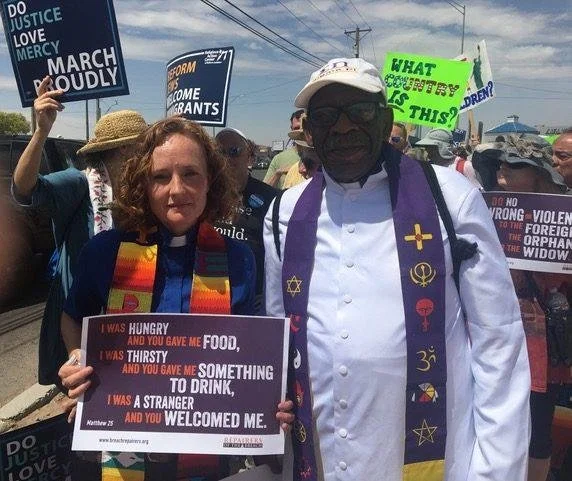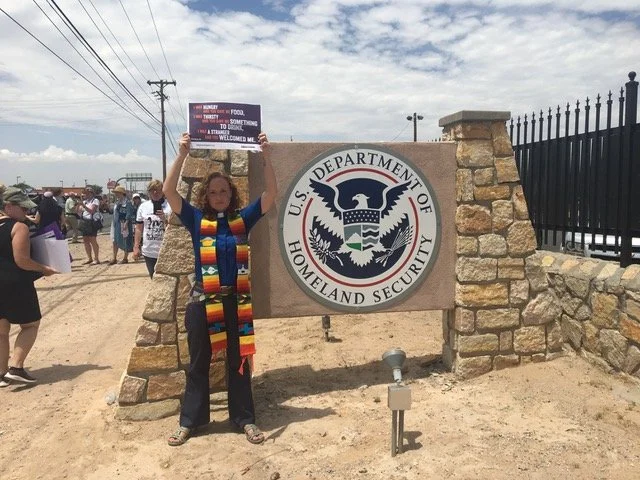Tragedies in El Paso won’t stop me from marching
This piece was originally published online by Broadview.
Days after I travelled to Texas to protest the treatment of migrants at the border, nearly two dozen people were shot and killed at a Walmart
“Are you safe?”
After the mass shooting in El Paso, Texas on Saturday that left 22 people dead, my phone blew up with messages.
“I’m safe in Canada,” I replied.
Just a few days earlier, I had attended Moral Monday at the Borderlands, a protest organized by a group called Repairers of the Breach. More than 500 interfaith clergy and others travelled from all over North America, invited by El Paso’s Border Network for Human Rights and by civil rights activist and Imam Omar Suleiman, to bear witness to the Trump administration’s cruel immigration policies. Referencing the commandments to love our neighbours found in all our sacred texts, we made demands for congressional hearings at the border, to end the inhumane practices of child detention, family separation and the “Remain in Mexico” program. We demanded due process for asylum seekers and the preservation of human rights.
On Sunday night, people who had been recently detained shared their testimonies of cold, overcrowded cells, lack of beds and adequate food, and constitutional rights that had been ignored. Children who haven’t committed any crimes have had their shoelaces taken because some, as young as four years old, have tried to hang or hurt themselves in custody. The young are schooled in despair. They don’t “smell like children should smell” or “smile like children should smile.” At least seven children have died inside the U.S. detention system in the last year, after a decade of no reported child deaths in custody. Together, we lamented America’s centuries-old legacy of white supremacy, propagated by church and state doctrines, that subjugates and dehumanizes non-whites and manifests in mass detention, incarceration and shootings.
On Monday, Rev. Dr. William Barber, the president of Repairers of the Breach, and a coalition of interfaith leaders led us to a detention centre, where some detainees had been on a hunger strike for weeks. A passerby yelled “build the wall!” as we stood at the gate and asked to be let in to pray with the detainees. Across the street, members of the Lone Star golf course paused briefly at their tees to take note of us, before hitting balls down green fairways. Barber spoke into the intercom, telling the detention centre guards, “it doesn’t have to be this way.” They answered with silence.
A similar silence fills me now as I wait for the world’s response to this mass shooting. Will it be dismissed, like many of the more than 200 other mass shootings in the States this year, as an isolated incident of a white male with mental illness, rather than terrorism?
In a statement released after the shooting, leaders of Moral Monday at the Borderlands condemned the attacks on immigrants and asylum seekers by the detention system and the El Paso mass shooter, saying “the extremism of this administration and some even in church, has unleashed a whirlwind of white rage. They will say there is no connection. But the Bible is clear that ‘life and death’ is in the power of the tongue.”
Calls to “build the wall” and “send her back” are part of this administration’s consistent pattern of dehumanization. Eradicate the “other” and take back “our” country against “invaders,” who invariably have darker skins, has been Trump’s clarion call. The deadly effects have not been localized to the border.
Years before I flew to El Paso, Trump’s rhetoric crossed into Canada, helping to unleash the pent-up white supremacy that has never been dormant, but sometimes conveniently shielded from the average white Canadian’s view. The month before the Quebec mosque shooter took aim, he lived on a steady diet of Trump, reportedly trawling the internet 819 times for Trump-related posts. In the year immediately following the U.S. presidential election (2017), police-reported hate crimes in Canada jumped 47 per cent from the previous year, after a few years of slow, steady increases. Two years ago, members of Pegida (a white nationalist anti-Muslim movement) began holding monthly rallies in Toronto.
This isn’t the first time my friends have texted after a march or direct action to ask me, “Are you safe?” After this week in El Paso, my understanding of the question has changed. I wonder if any of us are safe? My daughter is brown. My sister is queer. My best friend is Muslim. I am a woman and scared for us all.
As I marched towards the black gates of the detention centre on Moral Monday, I grieved for the strangers inside who are beloved family members and friends of people I may never meet. When I heard about the shooting on Saturday, I mourned for the people I met who are now burying their dead. I thought about our human family and knew I could never let fear stop me from marching.
As the new week dawns, I carry glimpses of two possible futures. The one where more guns and higher walls tear us apart, and the one where people from all over North America cross state boundaries, national borders and cultural differences to stand together as one human family. Only the second will save us.



